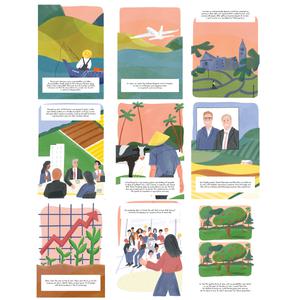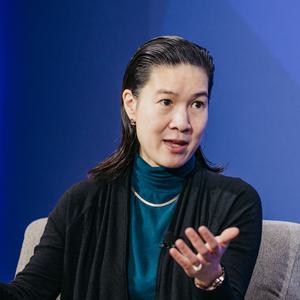2013
From human to plant microbiome
Inspiration for Flagship’s first agricultural technology company began with the launch of Seres Therapeutics in 2012, demonstrating the ability to identify microbes in humans that have beneficial effects on disease states. This capability inspired an exploration into whether microbes were also central to the health and development of plants. Uncovering microbes that could dramatically improve crop health, resilience, and yield led to the launch of Indigo Agriculture in 2013. Indigo’s biotrinsic biological products are composed of bacteria or fungi that are isolated from plants thriving in challenging conditions. Applying these microbes to seeds helps the resulting plants power through stress from heat, drought, disease, or nutrient deficiency. Today, farmers in four continents are using these products, minimizing the need for synthetic inputs such as fertilizers and pesticides that degrade soil health and contaminate waterways.
Indigo has two sustainability programs that allow farmers to get paid for various land management decisions that result in planet-positive outcomes: The carbon program helps farmers get paid for adopting practices that sequester carbon and abate greenhouse gas emissions through the production of high-quality, registry-issued carbon credits. In June 2022, the company completed its first crop of agricultural carbon credits, representing nearly 19,000 tonnes of carbon dioxide that was removed from the atmosphere via natural processes. More importantly, this represents scientific, technical, and procedural proof that farmers can quantifiably put carbon into the soil at scale. Indigo’s Market+ Source program offers another opportunity for farmers to increase profitability by selling their sustainably produced crops at a premium to companies looking to influence the climate impact of their supply chains. Today, Indigo connects farmers to globally recognized companies, such as Anheuser-Busch and The North Face, to abate greenhouse gas emissions and reduce water usage.
2015
Farming goes digital
The ability to gather data and analyze it has transformed nearly every industry, and agriculture is no exception. CIBO Technologies was launched in 2015 to apply digital modeling and simulation to the farm field, helping to accelerate the transition to regenerative agriculture. CIBO’s platform equips enterprises to deliver and support carbon and regenerative programs to growers while quantifying and verifying the environmental impact of operations at scale. Businesses gain visibility to greenhouse gas emissions and scope three reporting capabilities across their entire up-stream and down-stream agricultural operations. The impact is lower greenhouse gas emissions, a food system that is more resilient to climate change, and less nitrogen and phosphorus leaching into waterways, as well as greater confidence for enterprises that they are making real, lasting impacts.
2016
Unlocking the full potential of seeds
The translation of technologies developed for human health to agriculture led to the launch of Inari Agriculture in 2016. The company is using genetic editing technologies to design seeds that produce dramatically higher yields with less water and chemical fertilizer inputs. While today’s genetically modified (GMO) seeds include foreign genes, gene edited seeds are developed by optimizing the plant’s native genome, accomplishing what could be done naturally via plant breeding much faster and with exacting precision. This is important because it hastens the regulatory process so these seeds could be planted on tens of millions of acres by the end of the decade, helping to substantially improve the productivity of some of the world’s largest crops (e.g.,
corn, soybeans, and wheat) while using less of the planet’s resources. Inari aims to increase yield by 20% in soybeans, 10% in wheat, and 10% in corn, while also improving corn’s water and nitrogen use efficiency by 40%.
2017
A more mindful approach to food production
Invaio Sciences was founded in 2017 based on insights into insect microbiomes. It began with a vision of the future in which crop-damaging pests could be rendered harmless with tiny amounts of precisely delivered antimicrobials. Since then, the Invaio team has been focusing on identifying the right natural bioactives, or cargo, together with the best biological and physical delivery systems in order to treat crops impacted by insects and diseases in a way that is better for crops, people, and the environment.
Making an impact on climate change
While Flagship and its sustainability companies are creating transformative innovations, the goal is not to focus on any one technology platform but to drive the sustainability of the planet as quickly and dramatically as we can. The evolution has already begun and the pathway to a planet positive food system is in sight. Now, Flagship and other innovators in the space need to continue to scale these and other solutions to the billions of acres spread across hundreds of millions of farms that produce our global food supply.






